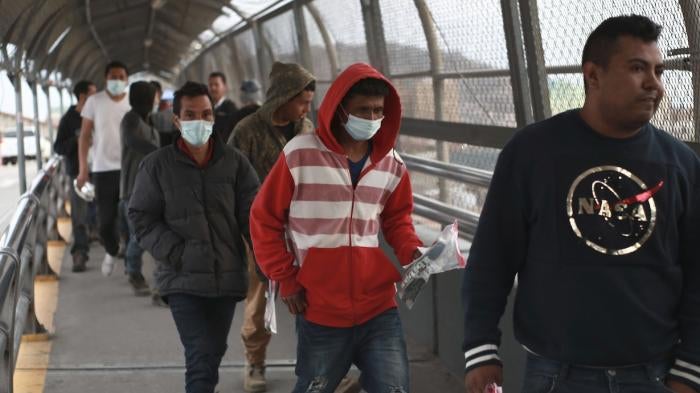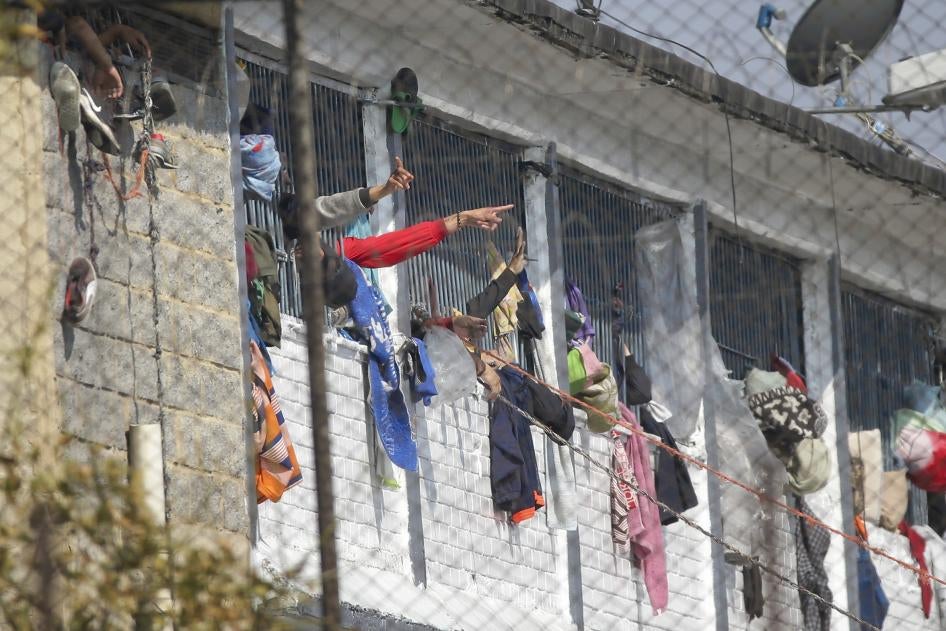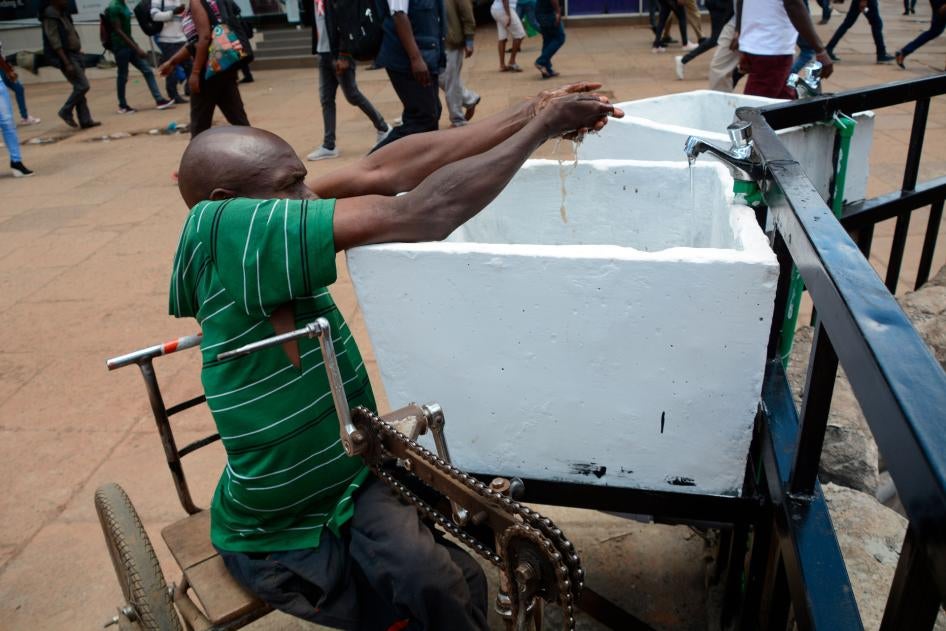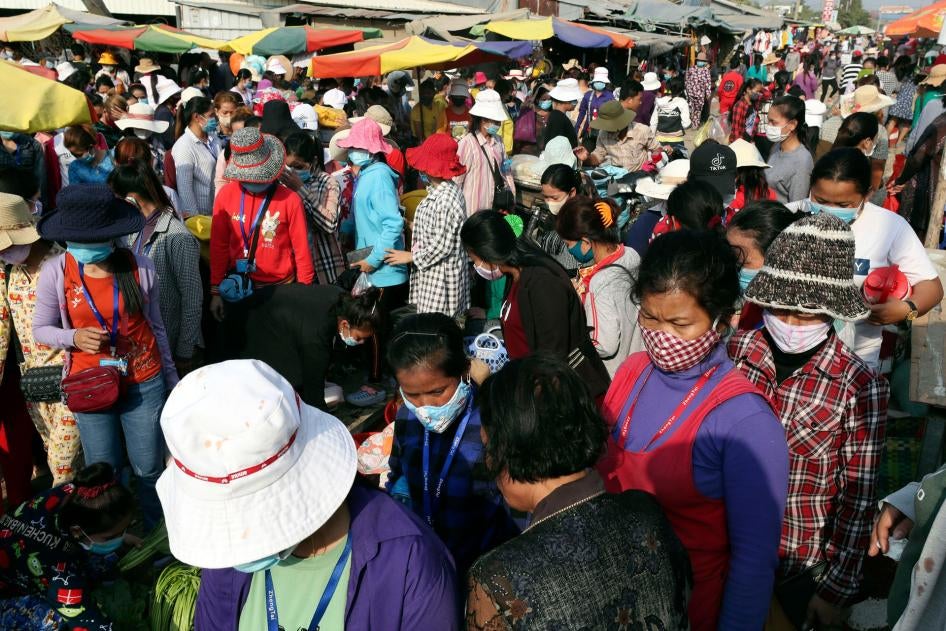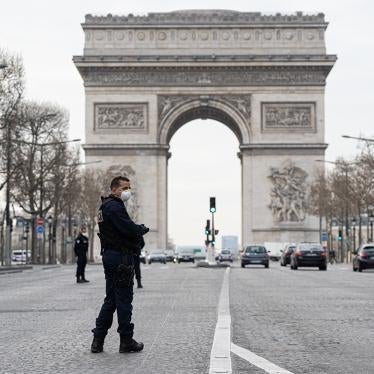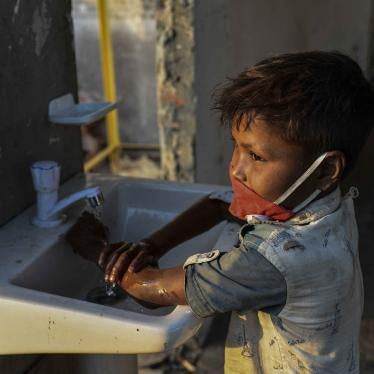Human Rights Watch is committed to reporting on the human rights dimensions of the COVID-19 pandemic. Our research has identified 40 questions to guide a rights-respecting response to this crisis that addresses the needs of groups most at risk, including people living in poverty, ethnic and religious minorities, women, people with disabilities, older people, LGBT people, migrants, refugees, and children. We have also identified a large variety of responses to the crisis, some of which are positive and others problematic. Positive examples are not intended as prescriptive measures for governments to adopt, but rather as evidence of policy choices open to governments that seek to take their human rights obligations into account. The inclusion of an example should not be taken as an endorsement or critique of that government’s entire approach to addressing the crisis, or its human rights record in general.
Prevention and Care
Keeping the Public Informed
- Is your government providing the public with timely, accurate, and accessible information on the spread of the pandemic?
- Is your government challenging COVID-19 denialism and actively opposing the prosecution of journalists, whistleblowers, and others who have raised legitimate factual concerns about COVID-19?
Government officials in Belarus, Brazil, Burundi, China, Mexico, Myanmar, Turkmenistan, the United States, and Zimbabwe have exhibited disturbing denialism about COVID-19, depriving their publics of accurate information on the pandemic. In India, authorities have done little to curb the spread of viral disinformation which claims that the minority Muslim community is deliberately spreading COVID-19. In contrast, United Kingdom police forces are reported to have launched investigations into similar efforts to smear Muslims there. In Bangladesh, Cambodia, China, Egypt, Ethiopia, Turkey, and Venezuela, journalists and others have been arrested and detained for reporting on or expressing opinions about COVID-19 on social media. Egypt and China have expelled journalists. In Bolivia, authorities have used COVID-19 as a justification to threaten political opponents with up to 10 years in prison for spreading “misinformation.” In China, outrage over the reprimand of a whistleblower led to a rare apology from the local police.
- Has your government lifted all internet shutdowns or broad restrictions on access to information online?
Ethiopia lifted a blanket ban on telephone and internet service in the western Oromia region, ending a three-month long shutdown, following criticism that the restrictions would impede the COVID-19 response. However, in the Rohingya refugee camps in Bangladesh and conflict-affected parts of Myanmar, people still cannot reach lifesaving information due to government-mandated internet shutdowns. In Kashmir, the Indian government has ordered low 2G internet speeds, throttling the internet and reducing the accessibility of treatment protocols that would help doctors there tackle COVID-19. In response to the crisis, the United Arab Emirates (UAE) and Oman have relaxed some of their longstanding restrictions on voice over internet protocol (VoIP) platforms to enable distance learning, allowing Zoom and Microsoft Teams. However, both UAE and Oman, as well as Qatar, retained the ban on other apps that allow people to make voice and video calls such as WhatsApp, Skype, and FaceTime.
- Is your government taking steps to address the digital divide by increasing the accessibility and affordability of internet access, especially in places under lockdown where education, work, and public information on COVID-19 have moved online?
In Peru, the government issued an order guaranteeing internet services even if users are unable to pay during the COVID-19 crisis. The Delhi government in India is reimbursing data packages for schoolchildren. Some African telecom operators are excluding “essential” websites from data usage caps to enable more affordable internet access during the pandemic.
Providing Testing and Treatment
- Is quality affordable health care accessible for everyone in your country as a right without discrimination?
In Portugal, the government has announced that it will treat people with pending residency and asylum applications as if they were permanent residents until June 30, giving them equal access to health care under the national system. The Italian government extended until mid-June all existing residency permits due to expire, giving those people access to national health care. While the US has made testing for COVID-19 free, millions of people in the US are uninsured and unable to get state-funded health care, and medical treatment for the virus still costs more than many people – even those with health insurance – can afford, which forces them to choose between seeking care or risking bankruptcy.
- If your government is maintaining COVID-19 quarantine or isolation facilities, is it providing people with health care, protection from infection, and food and water?
In China, 10 people died when the building where they were forcibly quarantined collapsed. In Nigeria, a state government only upgraded its isolation facilities after a woman who did not have coronavirus died in its care. In Burundi, unsanitary and crowded quarantine facilities have drawn criticism. In Uganda, the government charged exorbitant fees to people for their own mandatory isolation. In Greece and Bosnia and Herzegovina, authorities say they are quarantining migrants in camps due to COVID-19 risks, but the absence of health precautions means the virus may easily spread. Qatar’s government has quarantined an industrial area where many migrant workers live, but has promised regular testing and monitoring and that salaries will be paid.
- Is your government trying to dismantle barriers to health care for people living in poverty and other historically marginalized groups like lesbian, gay, bisexual, and transgender (LGBT) people, people with disabilities, and indigenous communities?
- Is your government taking steps to facilitate safe access for people who avoid medical treatment due to fear of immigration enforcement?
To remove barriers to care, a government official in Pakistan publicly committed to help transgender people. The US government clarified that a problematic new rule, which bars migrants who have used public benefits from being able to secure permanent residence, would not apply to COVID-19 care. In the Maldives, the government established a new COVID-19 clinic for migrant workers that does not require showing work permits. In Malaysia, authorities promised not to arrest undocumented migrants and refugees who had potentially been exposed to the virus at a religious gathering if they came forward for testing. In contrast, in Lebanon, curfews and restrictions on movement have been introduced for Syrian refugees while in Nigeria, people with mental health conditions remain shackled in crowded facilities.
- Are testing kits and ventilators being deployed equitably?
The European Union announced in mid-March that it would set up a new regionwide “stockpile” of medical equipment, including ventilators and vaccines. The African Union has pledged to distribute donated test kits and equipment in equal number to all countries despite varying needs. Test kits provided by the World Health Organization (WHO) to the Syrian government have not been equitably distributed to opposition-held areas. Some indigenous populations living on reservations in the US get care through a parallel health system that has limited COVID-19 testing capacity. For the two million Palestinians living under Israel’s closure of Gaza, restrictions on medical imports and denial of transit permits is impeding the crisis response. In Myanmar, internally displaced Rohingya in camps that have limited health care services require authorities’ permission to obtain urgent treatment outside the camps. Triage protocols that put people with disabilities lower on the list for ventilators have led the US government to warn that such “ruthless utilitarianism” is unacceptable.
- Has your government stopped enforcing international trade sanctions that limit access to health care?
The UN has called for lifting of sectoral sanctions, noting that “impeding medical efforts in one country heightens the risk for all” as evident in Iran, where sanctions have undermined the country’s ability to respond to COVID-19.
Protecting Doctors and Frontline Workers
- Is adequate protective equipment being provided to health care workers?
- Is the government taking steps to protect health care workers from reprisals for being potentially exposed to the virus?
Frontline health care workers, 70 percent of whom are women, are working punishing schedules, increasing risks of infection and burnout. The Italian Red Cross runs a hotline for health care workers seeking counseling. UK doctors complain of pressure on health care workers not to speak out, while doctors in Pakistan were arrested for protesting a lack of protective equipment. In Italy, South Africa, Spain, the US, and many more countries, health care workers have faced seriousshortages of protective equipment. In many places, community groups are assembling makeshift masks and aprons. In India, Myanmar and the UK, landlords have evicted doctors and nurses because they might be carriers of the virus; the Indian government threatened charges against these landlords.
- Are businesses and governments ensuring employees who work in essential situations such as mass transit, grocery stores, delivery and warehouses, prisons, and at-home care have adequate protection against COVID-19 and access to testing?
In the US, Whole Foods, Instacart, and Amazon employees have gone on strike to seek protective equipment and hazard pay. Prison and jail employees and unions in the US, Canada, and the UK have also demanded more equipment and testing.
Reducing Risks in Detention Facilities and Jails
- Is your government reducing its prison, jail, and immigration detainee population to ease crowding and allow for “social distancing”?
The UN Committee on the Prevention of Torture called on governments to “reduce prison populations … wherever possible by implementing schemes of early, provisional or temporary release.” In Argentina, Brazil, Colombia, Iran, Italy, Peru, Thailand, and Venezuela, people in jails and prisons have protested overcrowding and poor hygienic and sanitary conditions that put them at greater risk of contracting COVID-19. The WHO released guidelines for prisons and detention centers to prepare for the pandemic but few immigrant detention facilities meet them, including in Australia, Canada, Europe, the Gulf, and the US, where detainees had to strike for soap.
Afghanistan, France, Indonesia, Iran, Italy, Jordan, Kenya, Pakistan, Poland, Sudan, and some US jurisdictions have released some prisoners to decongest their jails. In the UK and the US, legal challenges have resulted in some people winning court-ordered releases from immigration detention. Belgium, the Netherlands, Saudi Arabia, and Spain have also released limited numbers of people in immigrant detention.
- Is your government releasing people who should not be in custody, including most pretrial detainees, people held for minor offenses, detainees who have not been charged, and non-violent juvenile offenders?
- Are authorities considering for release prisoners at greater risk of serious illness from the virus, including older people, people with underlying health conditions, people with disabilities, and pregnant people?
In Chile and the US, officials have stated they will consider releasing older people in custody. In Argentina, people with elevated health risks have been identified as candidates for alternatives to detention. In the US, some pregnant people were released. Brazil is releasing children in detention for non-violent offenses. Jordan released some people in pretrial detention. In Russia, Moscow’s law enforcement officials said they would seek alternatives to pretrial custody. In the US, releases from the federal system will be decided using a discriminatory algorithm, which has a demonstrated racial and class bias.
- Has your government released political prisoners and others wrongfully or arbitrarily imprisoned, including human rights defenders, journalists, and political activists?
Bahrain, Egypt, and Iran released some political prisoners and detained opposition politicians but left other prominent detainees in prison. Turkey is expected to pass a law releasing many prisoners, but excluding detained journalists, human rights activists, and political prisoners held on bogus terrorism charges. Political prisoners remain behind bars in Kyrgyzstan, Myanmar, and many other countries, and releasing people arbitrarily detained in Cambodia, Cameroon, Libya, South Sudan, Syria, and Yemen is even more urgent now due to the risk of COVID-19. China should also immediately end the mass internment of Turkic Muslims in Xinjiang.
- Has your government told its police forces to stop arrests of sex workers, non-violent drug offenders, people arrested for “moral crimes,” and others who should not face criminal punishment, to avoid adding to crowded jails?
Uganda, which criminalizes homosexuality, arrested LGBT youth at a shelter in late March. Some police forces in US cities, including Miami, Philadelphia, Phoenix, and Tucson, have said they will not make arrests for “low-level” violations, like narcotics offenses and sex work. The state’s attorney in Baltimore has said she will not file charges for these crimes. However, other US cities, such as New Orleans, continue to arrest people for minor offenses.
Boosting Access to Water and Sanitation
- Is your government using best practice humanitarian standards to guide support for refugees, asylum seekers, internally displaced people, and migrants living in crowded camps on its territory?
In countries where refugees, migrants, asylum seekers, and internally displaced people live in camps, such as Bangladesh, Lebanon, Myanmar, Nigeria, Sudan, and South Sudan, there’s a high risk of devastating COVID-19 outbreaks due to overcrowding, weak sanitation, and insufficient health care services. In Italy, tens of thousands of asylum seekers live in large reception centers, often with shared rooms and cafeterias. In Lebanon, the UN refugee agency UNHCR is working with refugees to share important hygiene information. Greece has imposed a 14-day lockdown on a camp near Athens with dozens of COVID-19 cases. Human Rights Watch has urged the government to move people from overcrowded camps on the Greek islands, prioritizing those most at risk. The UN is seeking US$2 billion in aid focused on helping poor countries, including many with refugee populations, as they deal with COVID-19.
- Is your government taking proactive steps to ensure continuous access to clean water for all, including suspending water shutoffs?
Good hygiene like handwashing is key to protecting public health and responding to the virus. In Liberia, Kenya, and Indonesia, handwashing stations have been installed in urban areas. The African Commission on Human and Peoples’ Rights has called for an “extension of timeline for payment for … water bills.” Spain and Argentina have guaranteed that water will not be cut off. Japan and Kosovo have deferred utility payments. Ten independent UN human rights experts say it is essential that governments “provide water free of cost for the duration of the crisis to people in poverty.” In Bolivia, the government is paying 50 percent of water bills, while Bahrain is paying the full water bill. In South Africa, the national government has appealed to municipalities to stop shutting off water for non-payment and is distributing water by tanker to informal settlements and other communities in need. In northeast Syria, Turkish authorities’ frequent restrictions of water supplies have left people there at risk of being unable to wash their hands effectively.
Helping Across Borders
- Is your government contributing to international efforts to raise and deploy funds to help other countries with their COVID-19 response?
The US, Canada, the European Union, the World Bank, and the African Development Bank have all recently approved emergency funding for humanitarian assistance to support developing countries’ response to COVID-19. Russia provided some medical supplies to the US at below-market cost. The Chinese government has been distributing testing supplies globally, although some recipients have been forced to recall defective tests and masks. Several multinational companies have announced aid efforts.
Rights-Respecting Crisis Management
Using Emergency Powers and Addressing Security Force Abuse
- Are emergency powers used in a way that is lawful, necessary, and proportionate?
- Are emergency powers time-bound and covered by legislative or judicial oversight?
- Is your government reporting any derogations (temporary suspension of performance of human rights obligations) to relevant treaty bodies?
At least 84 countries have imposed emergency policies and measures due to the COVID-19 crisis, but according to publicly available notifications deposited with the UN, only 11 countries have formally informed the UN of derogations from their human rights obligations as of April 15. Bolivia, France, and Morocco have imposed “health” emergencies without formally notifying relevant treaty bodies of their derogations. Some countries, including Argentina, Ethiopia, and Portugal, have included clear end dates for emergency powers, allowing for debate and discussion around their renewal. Hungary has adopted and Cambodia is close to adopting a state of emergency law that gives the government unlimited powers for an indefinite time. In Israel, an attempt to effectively suspend the Knesset drew criticism as an abuse of power. In Thailand and Bolivia, new emergency laws and decrees appear to allow broad censorship, undermining free speech. The UK’s emergency coronavirus legislation weakens protections against detention for people with mental health conditions and disabilities and undercuts social care for older persons.
- If state security forces are enforcing “social distancing” or delivering medical supplies, are officials taking steps to prevent abuse and hold officers accountable?
In Democratic Republic of Congo, France, Kenya, the Philippines, South Africa, and Uganda, police abuse of people found to be violating curfew or stay-at-home orders have drawn criticism. In Panama, a transgender woman was detained for being out on a day designated “for women” under a scheme that allows women and men to leave home on alternating days. In Uganda, where women were forced to undress during an incident of police abuse, and South Africa, where children were injured as a man was shot in front of his home, authorities have promised to prosecute and punish the officers responsible.
Avoiding Sacrificing Other Rights
- Is your government’s use of digital surveillance technologies to respond to the pandemic narrowly tailored to protect the right to privacy, assembly, and expression?
- Do the technologies being deployed meet the 8 conditions for digital surveillance outlined by more than 100 civil society groups in April?
Digital surveillance is being deployed for contact tracing, to enforce quarantines, to assess general trends on how the virus might be spreading, or to determine the effectiveness of “social distancing,” among other reasons. In their COVID-19 response, China, Iran, and Russia are using digital surveillance measures that threaten individuals’ right to privacy, free expression, and association. Armenia and Israel passed sweeping laws that threaten privacy by requiring telecommunications companies to turn over phone call histories and location data to authorities. In South Korea, new regulations allow authorities to send anonymized information about individuals’ movements to the general public, but the updates have included enough detail that they left people wary of their private lives being exposed. While data protection guarantees vary in each context, France, Germany, India, Italy, Poland, Singapore, the UK, and the US are also exploring or already using cell phone location data or facial recognition.
The UN has warned that strong data governance frameworks are key to prevent actors from “taking advantage of the crisis to violate human rights or implement systems for mass surveillance.” More than 100 independent groups identified 8 conditions for using surveillance technologies. The voluntary and participatory nature of efforts in Taiwan to utilize technology allayed some fears. Efforts to conduct proximity tracing using anonymous, encrypted Bluetooth technology on a voluntary and decentralized basis are taking more measured and privacy-centered approaches.
- If your government is closing borders, does it allow people to present asylum claims?
Brazil, Hungary, and Uganda have closed their borders to those seeking to present asylum claims. The US is summarily returning people who cross its land borders irregularly without allowing them to file asylum claims. Canada has temporarily closed its southern border, resulting in the return of asylum seekers to the US. UNHCR has made clear that COVID-19 does not justify these measures. While Greece temporarily imposed a month-long suspension of asylum claims, it lifted that ban in April. The European Commission has said that temporary closures of EU external borders should not apply to people in need of international protection or other humanitarian needs. Nonetheless, Italy issued a decree closing its ports to search and rescue operations, citing COVID-19.
- Is your government ensuring that restrictions on movement and bars on “non-essential” medical procedures don’t undermine the right to abortion care?
- Are contraception and adequate maternal health care still readily available?
In the US, some state governments have declared that abortions are non-essential surgeries and shouldn’t be performed during the pandemic, violating international legal protections for sexual and reproductive health. Ireland approved the use of telemedicine for counselling prior to abortion. Within the UK, health authorities in England and Scotland have now allowed at-home use of an early abortion pill during quarantine, but women in Northern Ireland face a highly restrictive situation. In France, senators blocked a motion to extend the window of time in which abortions can be performed, which may have ensured access to abortion care after movement restrictions are lifted. Hospitals in Italy are increasingly considering abortions to be “deferrable” procedures and postponing them.
Due to supply chain disruptions, health providers in Myanmar, Uganda, Zimbabwe, and many other countries are facing stock-outs of reproductive health commodities. After an outcry when private hospitals banned partners of women giving birth, New York’s governor ordered hospitals to allow these companions.
Addressing the Economic Fallout
- Are your government’s plans to mitigate the economic harms of COVID-19 based on guaranteeing basic economic rights to all, including low-income, undocumented, and informal sector workers?
In India, Lebanon, Pakistan, and South Africa, lockdowns have especially harmed those who secure low incomes in the informal sector. In the Middle East, domestic workers are at risk of being forced to work around the clock. Without government support for poor families in economic crisis, rates of child labor and child marriage are expected to rise. In the US, the economic stimulus package excludes more than 8 million tax-paying workers who are undocumented, and only guarantees sick leave to some. The US specifically excludes those who earn income from “displays of a prurient sexual nature” from accessing preferential loans being offered to small businesses, which would prevent legal sex workers, and those in dance and theater productions, from getting help. In India, a relief package of 1.7 trillion rupees ($22.5 billion) will provide free food and cash transfers to poor and vulnerable populations and insurance for health care workers. Uganda has promised food distribution to benefit vulnerable populations, including breastfeeding women and daily laborers, and Rwanda has promised 20,000 families in the capital “door to door” food delivery, but in both countries many other people living in poverty won’t be covered by these programs.
- Is your government taking steps to prevent people from losing adequate housing?
- Is the government mobilizing services to support migrant workers whose homes are far from work places and those homeless or living in informal camps?
Recognizing the role of housing in the crisis response, Argentina, Australia, Ireland, and many other governments have announced measures to stop evictions. The UK and South Africa have promised all homeless persons will be given accommodation. In Berlin, Germany, the regional government has opened a former youth hostel to hundreds of homeless people, providing access to washing facilities. In Italy, calls are mounting on local governments to provide housing and sanitation to migrant agricultural workers in makeshift camps. India pledged to support hundreds of Nepali migrant workers at the border trying to go home.
- Is your government mobilizing additional support for poor children who relied on school for meals?
In the US, meals-to-go are available at some public schools while food delivery by mail programs have been implemented in some rural areas. The UK is replacing free school meals with supermarket vouchers in some areas, food-to-go in others, and cash transfers elsewhere. Cape Verde announced one month of food assistance for low-income families and children who relied on the school meal program. South Africa has not launched any school feeding programs for children to access during their nationwide lockdown.
- Is your government supporting women who are likely to bear a disproportionate share of childcare due to school closures and movement restrictions?
With over a billion students out of school, additional care work will likely fall on women who already performed three times as much unpaid care work as men. A new paper from a group of economists from the US and Germany predicts that COVID-19 will have a “disproportionate negative effect on women and their employment opportunities.” In Australia, the government has made childcare free for working parents while Japan has made subsidies available to companies to provide paid leave to those unable to work due to childcare responsibilities.
Responding to the Harms of “Social Distancing”
Psychosocial Support
- Is your government making mental health services available to its population, considering the psychological toll of “social distancing,” the economic impact, and losing loved ones to COVID-19?
New York City, the epicenter of the outbreak in the US, has committed to providing free psychosocial counseling by phone to all residents. In Italy, the epicenter of the outbreak in Europe, the government has launched a nationwide psychological support program. In Australia, a dedicated “coronavirus wellbeing support line” has been announced.
Keeping Kids Learning
- If your government has closed schools, is it taking steps to ensure all children can study from home?
Over 1.5 billion students – more than 90 percent of those enrolled around the world – are out of school due to closures in at least 188 countries. In Canada, some provinces are mailing physical copies of work home to students to ensure accessibility to those without computers, instead of relying entirely on an online curriculum. Italy allocated 85 million euros in mid-March to support distance education, including training for teachers and computers for students.
- Is your government making distance learning systems accessible to historically marginalized communities, including children with disabilities?
Lebanese schools have not made resources available to children with disabilities that would enable them to benefit from remote learning, while in Argentina, services for these learners have been temporarily suspended until the quarantine is lifted.
Tackling Violence in the Home and Against Minorities
- Are state authorities challenging xenophobic and anti-migrant hate speech?
Discrimination and hate crimes linked to COVID-19 have targeted Asians in the Middle East, Europe, and the US, and also foreigners and visitors from the diaspora in Cameroon, Indians from the northeast of the country, Muslims in Cambodia, and members of a South Korean religious group. In the US, rhetoric focused on labeling the virus as “Chinese” or “Wuhan” has coincided with a spike in acts of anti-Asian bias. Hungary’s leader Viktor Orbán has weaponized coronavirus to attack migrants and fuel xenophobia.
- Is your government mobilizing resources to support victims of violence at home?
UN Women has warned lockdowns can lead to higher rates of violence in the home, as evidenced by spikes in domestic violence in Brazil, China, France, Kenya, Kyrgyzstan, and South Africa. LGBT individuals also face heightened risks of such violence. France is offering 20,000 nights of free accommodation to victims of violence and is encouraging people to seek help discreetly with a code word at pharmacies. In Italy, local authorities have been authorized to requisition hotels to accommodate people fleeing violence in the home. In India, a state government has set up a special domestic violence hotline. The UN special rapporteur on violence against women has suggested providing online chats and texting services for victims.
Since teachers are often best positioned to identify abuse and seek appropriate intervention, child abuse may go undetected due to school closures. In Germany, children “at risk” will not be checked as frequently by child protective services since those agencies are operating at reduced capacity. To address the spread of COVID-19, some nursing homes for older people in the US and Australia have imposed policies that ban visitors, but these measures also reduce the important oversight that external visitors can provide to identify abuse.
